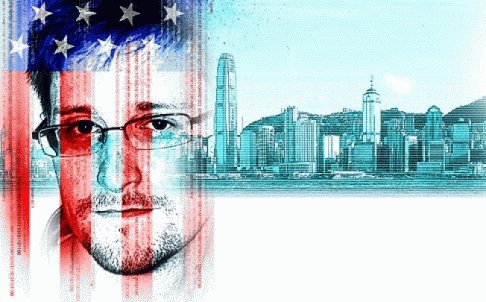It takes a former CIA asset to beat US "intelligence" -- more like intel deprivation. The story of Edward Snowden's escape from Hong Kong is textbook. This correspondent, at dim sum on Sunday, was alerted by a source; "Get ready for something big; he's leaving soon." That was about 12:30 pm Hong Kong time. In fact Snowden had already flown from Chek Lap Kok on SU 213 bound for Moscow at 11:00 am. But nobody knew it yet. Hong Kong was still digesting the front page of the South China Morning Post displaying yet more devastating evidence of US cyber-spying of China.
By 2:00 pm there was a first, one-line alert from the South China Morning Post; he was on a plane to Moscow. I talked to RT in Moscow; they were stunned and sprang into action. Still total silence from Western corporate media. Then the Post confirmed the breaking news with more detail. Yet it took ages for Reuters to release its first short dispatch -- as I had commented on my Facebook page. When the "international community" started to learn about it Snowden was already five hours into his flight.
First a set of general revelations to The Guardian. Then he went underground to prepare his escape -- as he knew Washington would come after him with all guns (drones?) blazing. And then, a final set of revelations to the South China Morning Post closely focused on Asia and China. When Washington woke up to it, he was already out of the building. Jason Bourne, eat your heart out.
Snowden was not "allowed to slip away." It all revolved around a meticulously timed operation involving Snowden, the Hong Kong government and WikiLeaks mediation.
The Hong Kong government statement was released at 4:05 pm (see here), again when Snowden was five hours into his flight. It stated he left "for a third country through a lawful and normal channel" because the government did not have "sufficient information to process the [US] request for provisional warrant of arrest."
So the US government thought it could simply intimate to Hong Kong to do it "our way or the highway" -- while at the same time news of US serial hacking of Hong Kong and China was front-page news. Once again, five hours into Snowden's flight to Moscow, US corporate media was still parroting the official narrative -- stressed by Obama's National Security Adviser Tom Donilon -- that the noose was tightening around his neck.
Whether Beijing had a subtly indirect input on the Hong Kong government's decision is open to a South China Sea of speculation. The fact is, not only was this a perfect solution for Hong Kong -- which would be facing relentless pressure from the US government to extradite him -- but also for Beijing, which maintains its upper-hand, furiously demanding a lot of explanations about the NSA targeting Chinese phone companies, the Asia-Pacific fiber-optic network and even Beijing's Tsinghua University.
That still leaves the matter of Snowden's US passport, which was revoked on Saturday. Depending on exactly when Hong Kong was officially notified, he might still have profited from a narrow window of opportunity to present a valid passport at Aeroflot's check-in window in Central Hong Kong, let's say around 9:00 am on Sunday, before taking the 20-minute ride in the Airport Express to Chek Lap Kok.
Or WikiLeaks may have provided an alternative legal arrangement. Not to mention the Russian consulate in Hong Kong, which remains mum.
It's all a communist plot
The predictable fury across Capitol Hill, with plenty of "hostile nations" rhetoric coupled with the inevitable demonizing of Russian President Vladimir Putin, not to mention NSA spy chief General Keith Alexander, among the usual platitudes about "defending this nation from a terrorist attack," depicting Snowden as an "individual who is not acting, in my opinion, with noble intent" -- this all reads like lazily written lines in a cheap spy thriller. For the Empire, getting a bloody eye is not taken lightly.
Washington is left with wishful thinking that Moscow might detain Snowden. Rubbish. Foreign Minister Sergey Lavrov had even advanced that Russia would consider granting political asylum if Snowden asked for it. And what about this priceless quote from Dmitry Peskov, Putin's spokesman? "I know nothing."
Xinhua, for its part, predictably had a field day with it; "Washington should come clean about its record first. The United States, which has long been trying to play innocent as a victim of cyber attacks, has turned out to be the biggest villain in our age."
So the final third of "The Snowden Adventure" is being played out now -- after he leaves his small capsule hotel room in Sheremetyevo airport's terminal E (the Four Seasons it ain't) and embarks towards political asylum in Ecuador via Havana. And with WikiLeaks gleefully tweeting the key moments of the saga, as in its official statement: "He is bound for the Republic of Ecuador via a safe route for the purposes of asylum, and is being escorted by diplomats and legal advisers from WikiLeaks."
The US Justice department is "disappointed" with Hong Kong's decision, and, as RT reports, is kindly asking Latin American countries to stop Snowden. So countries around the world should follow the example and "kindly ask" Washington to dismantle its worldwide Empire of Bases.
Among all the excitement provoked by this thriller, one should not lose focus; the most crucial aspect of the story is Obama and spy supremo Keith Alexander swearing that the Orwellian privatized intelligence-corporate-industrial complex is essential to prevent terrorism. It is not. This is a monumental lie -- and Obama is complicit.
(Note: You can view every article as one long page if you sign up as an Advocate Member, or higher).






